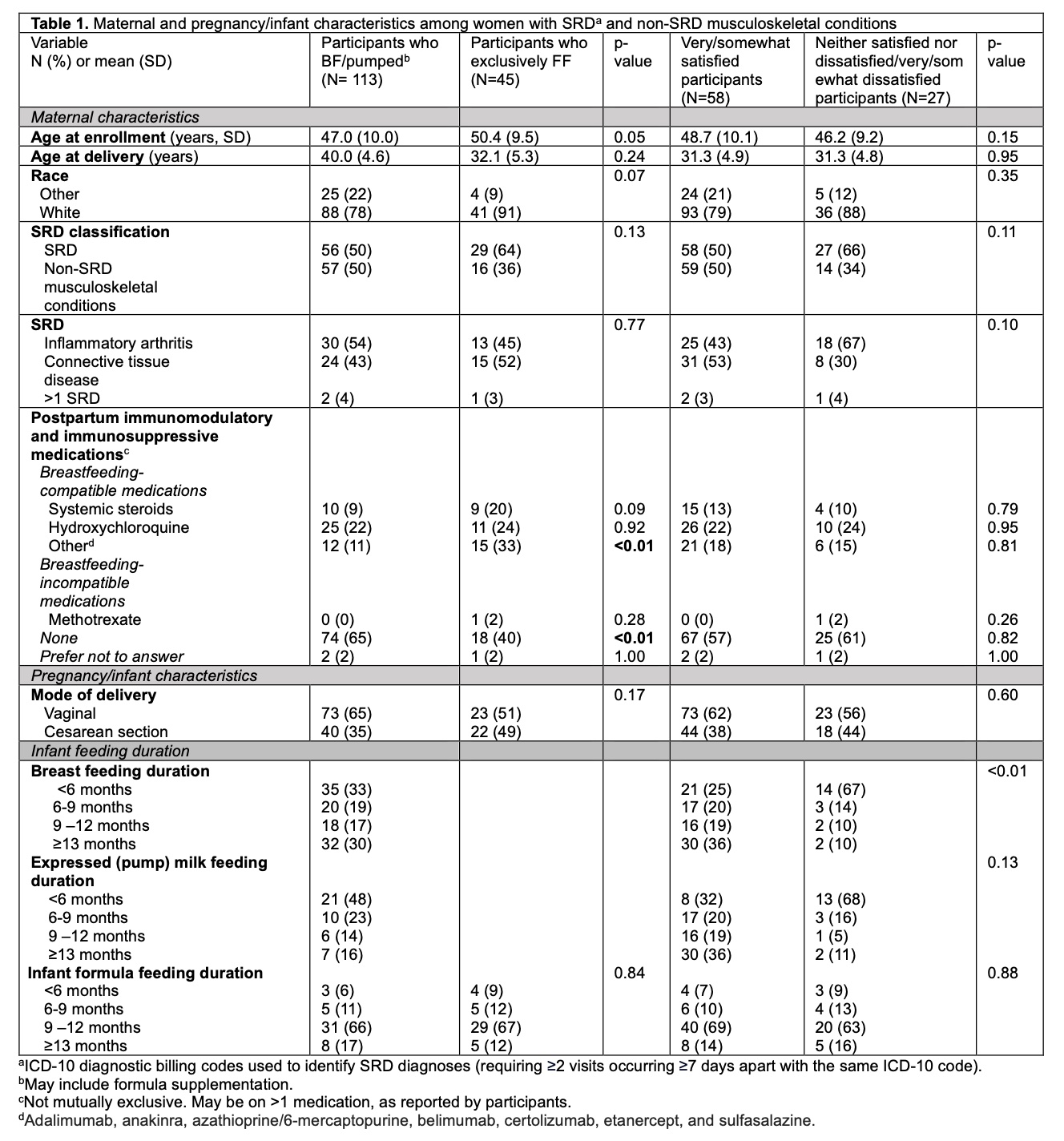Session Information
Session Type: Poster Session A
Session Time: 10:30AM-12:30PM
Background/Purpose: Although guidelines support acceptability of breastfeeding (BF)/pumping in women with systemic rheumatic diseases (SRDs) when taking BF-compatible medications, little is known about factors influencing infant feeding practices. We describe infant feeding practices (BF/pumping versus exclusive formula feeding [FF]) and factors influencing infant feeding among women with SRDs at first delivery.
Methods: Women aged 18-65 years evaluated by a Hospital for Special Surgery rheumatologist ≥2 times from 2020-2022 were enrolled in the Rheumatology Women’s Reproductive Health and Wellness Cohort. Characteristics of women with SRDs (identified by ICD-10 code-based algorithm) and non-SRD musculoskeletal conditions who self-reported delivering ≥1 child and answered questions on maternal and fetal characteristics, postpartum medication use, infant feeding practices, factors influencing infant feeding practices (each domain rated 0: “not at all influenced” to 5: “strongly influenced”), and satisfaction level for their first delivery were tabulated. We used descriptive analyses to compare maternal and fetal characteristics and factors influencing infant feeding practices in women who BF/pumped versus those who FF exclusively. We also stratified by satisfaction level (very/somewhat satisfied versus neither satisfied nor dissatisfied/very/somewhat dissatisfied) with infant feeding practices.
Results: Of 158 respondents, 56% with SRD and 44% with non-SRD musculoskeletal conditions, 113 (72%) BF and 45 (40%) exclusively FF; among those with SRD, 56 (66%) BF and 29 (34%) exclusively FF. No significant differences in maternal disease characteristics were noted between those who BF versus FF (Table 1). While a higher proportion of those who BF used no medications postpartum (p< 0.01), use of BF-compatible disease modifying and biologic medications postpartum was more common among those who FF exclusively (p< 0.01). Among those with SRD, factors associated with infant feeding practices included rheumatology/musculoskeletal medication use, experience or expectations of loved ones, social media, and workplace policies or expectations (p < 0.03) (Table 2). Respondent characteristics did not differ by satisfaction level with infant feeding experience, and among those with SRD, only breast discomfort and/or lack of milk production was significantly associated with satisfaction with infant feeding practices (p< 0.01) (Table 3).
Conclusion: Infant feeding practices vary among those with SRD. Multiple factors, some related to SRD and others unrelated to SRD, are associated with infant feeding practices. Awareness of infant feeding practices is needed for rheumatologists to develop patient-centered strategies related to infant feeding that will ensure feeding strategies align with patient preferences and best practices.
To cite this abstract in AMA style:
Lieber S, Masto L, Smole A, Lan R, Parides M, Levine J, Stamm B, Siegel C, Mandl L, Lockshin M, Barbhaiya M, Sammaritano L. Factors Associated with Infant Feeding Behaviors Among Women with Systemic Rheumatic Diseases [abstract]. Arthritis Rheumatol. 2024; 76 (suppl 9). https://acrabstracts.org/abstract/factors-associated-with-infant-feeding-behaviors-among-women-with-systemic-rheumatic-diseases/. Accessed .« Back to ACR Convergence 2024
ACR Meeting Abstracts - https://acrabstracts.org/abstract/factors-associated-with-infant-feeding-behaviors-among-women-with-systemic-rheumatic-diseases/



